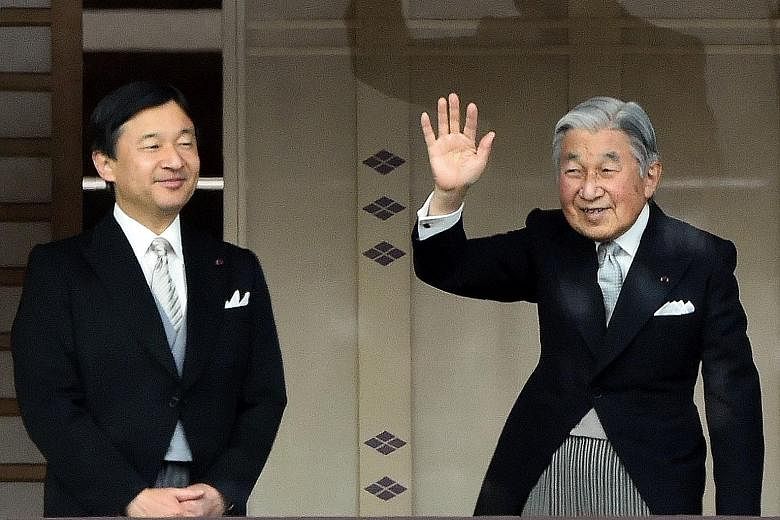Japan has passed a law to allow Emperor Akihito to step down in favour of Crown Prince Naruhito, in what would be the country's first abdication in some 200 years.
In a rare public address, the Emperor, who would be the first Japanese monarch to abdicate since Emperor Kokaku in 1817, had hinted at his desire to step down last August, citing old age and health.
But there was no law governing what to do with a monarch wanting to retire from what is meant to be a lifetime job.
The special one-off law, which was passed yesterday by the Upper House, would apply only to Emperor Akihito, 83, and expire in three years. It is widely expected that he will hand over the Chrysanthemum Throne on or around his birthday on Dec 23 next year.
The Emperor, who ascended to the throne in 1989, is known for supporting pacificism and consoling victims of natural disasters, along with his wife, Empress Michiko.
Crown Prince Naruhito, 57, will become the 126th monarch in the world's oldest hereditary bloodline said to date back to 660BC. Next in line will be his brother, Prince Akishino, 51, and then the latter's son, Prince Hisahito, 10.
The proposed abdication triggered concerns about succession and renewed debates about whether female rulers should be allowed.
Under the Imperial Household Law, only males are allowed to ascend the throne, which means the burden of producing a heir will fall squarely on the young prince and his future wife.
The ruling Liberal Democratic Party (LDP) has been reluctant to consider the idea of a reigning female monarch. Kobe College historian Hideya Kawanishi told The Straits Times: "To them, the status of a man will always be higher than that of a woman, and so they see it as a must to strenuously avoid a woman acting as the country's symbol."
Hence, while female commoners can marry into the imperial family - as had Empress Michiko, 82 - male commoners are forbidden to do so. Female royals lose their status if they marry commoners.
This issue was highlighted recently when the impending engagement of Emperor Akihito's granddaughter, Princess Mako, 25, to paralegal Kei Komuro, 25, was announced. If she loses her status, the number of imperial family members will fall to 18, of whom 13 are women and eight are below age 40.
Amid concerns about the shrinking pool of royals, a non-binding supplementary resolution was passed last week, stating: "Issues related to ensuring stable imperial succession and the creation of female-led imperial branches are important matters that cannot be postponed."
Introducing female-led imperial branches means Princess Mako will effectively be allowed to retain her royal status after marriage. It could mean allowing the succession line to pass through females - for example, if the princess has a son, he will be considered for the throne - but the LDP is unlikely to support this.
The opposition had wanted to fix a timeline to deal with these issues but the LDP was reluctant, fearing it would upset its core right-wing support base. But it is a matter of time before Japan needs to confront the issues surrounding the monarchy, experts said.
Dr Jeffrey Kingston, director of Asian studies at Temple University Japan, said: "Allowing female rulers will be a more pragmatic policy."

